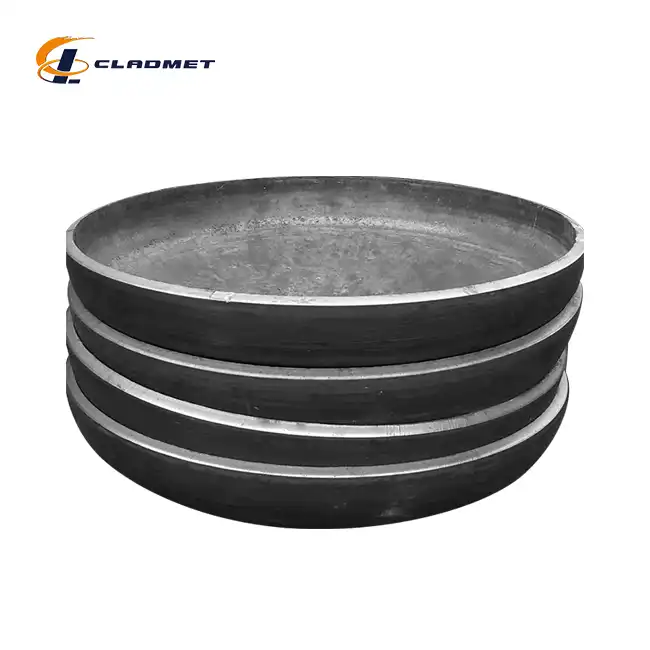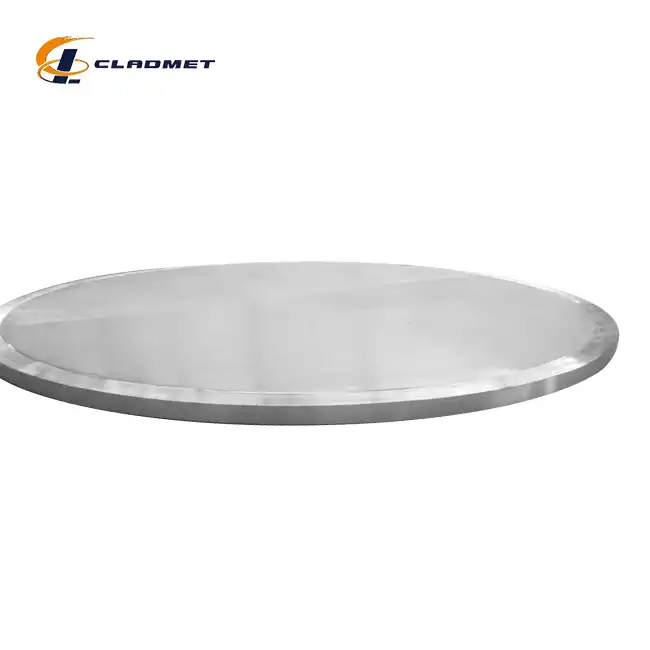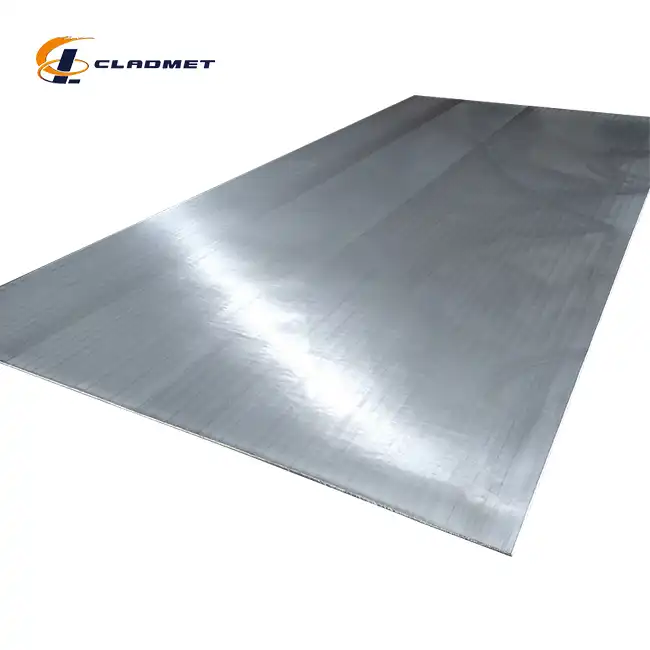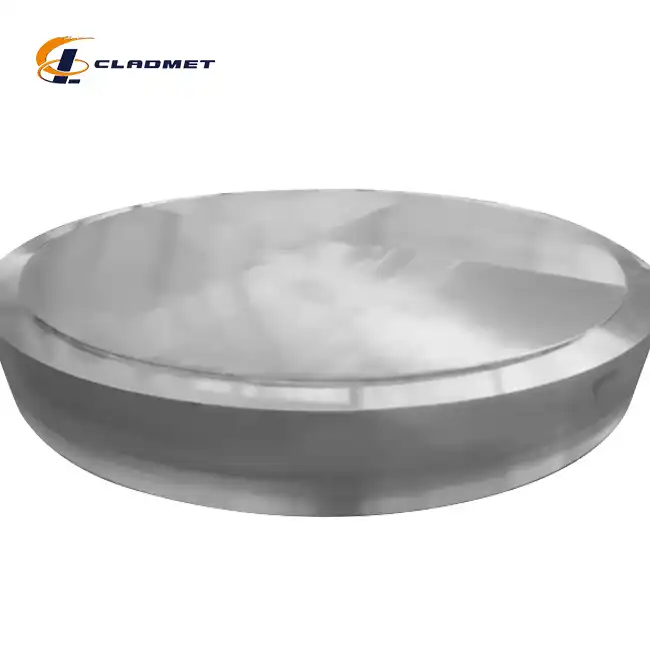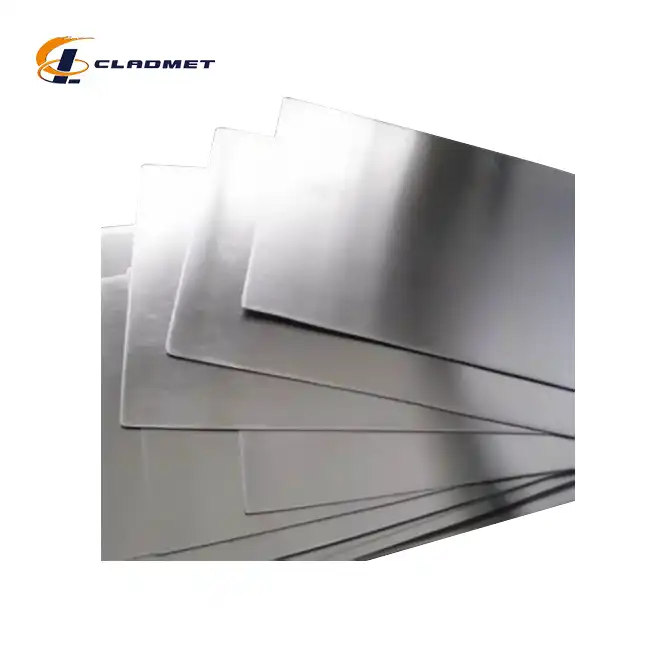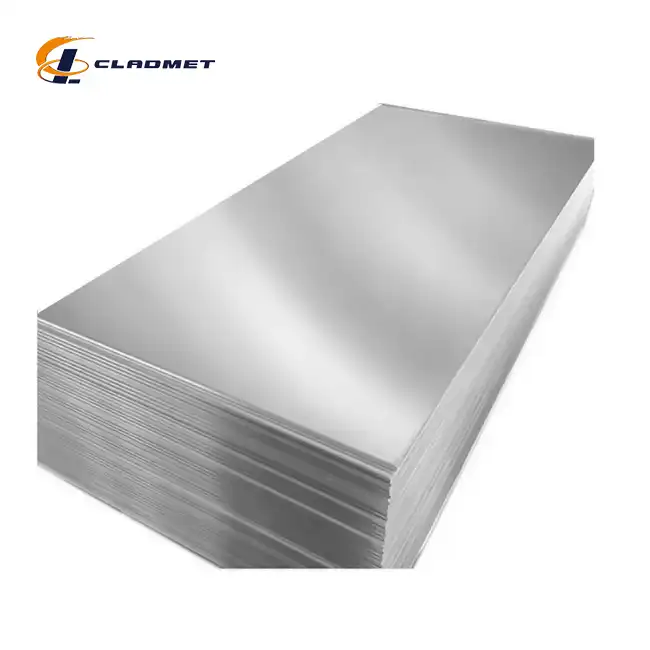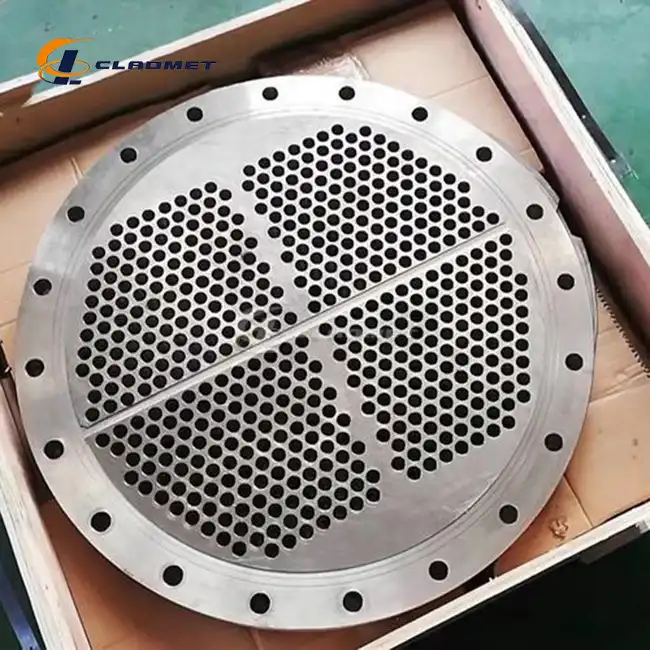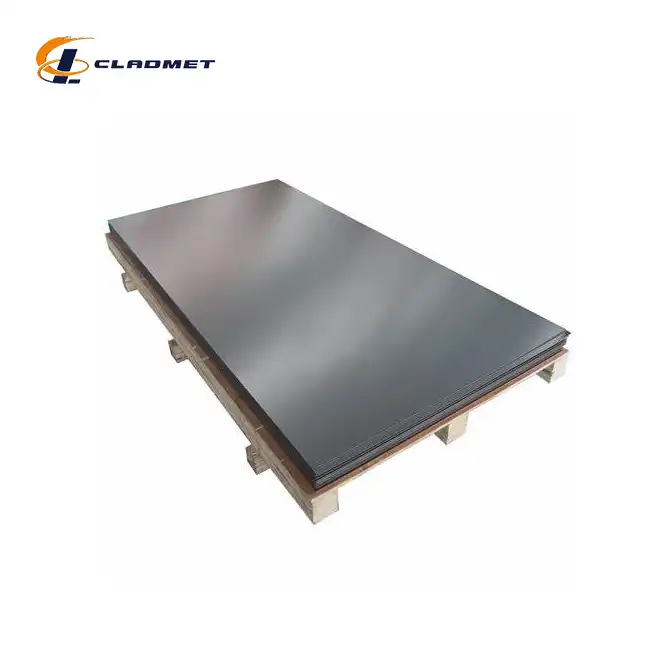What Industries Commonly Utilize Zirconium-Steel Clad Plates?
 2025-04-01 09:15:23
View:389
2025-04-01 09:15:23
View:389Zirconium steel clad plates represent one of the most significant innovations in materials science for industries operating in challenging environments. These composite materials, formed by bonding zirconium layers to steel substrates, provide an exceptional combination of properties that make them invaluable across numerous sectors. The fusion of zirconium's outstanding corrosion resistance with steel's structural strength creates a material capable of withstanding extreme conditions that would rapidly degrade conventional materials. Zirconium steel clad plates are primarily utilized in petrochemical processing, power generation, chemical manufacturing, pharmaceutical production, and marine engineering applications where exposure to highly corrosive substances and extreme operating conditions is commonplace. The unique properties of these composite materials make them essential components in equipment that handles aggressive chemicals, high temperatures, and high-pressure environments, providing both exceptional performance and extended service life compared to traditional materials.

Key Industries Benefiting from Zirconium Steel Clad Plates
Chemical Processing Industry
Acid Processing Equipment
The chemical processing industry relies heavily on zirconium steel clad plates for equipment that handles aggressive acids and corrosive chemicals. In facilities where sulfuric, hydrochloric, and nitric acids are processed, conventional materials would rapidly deteriorate, leading to frequent equipment failures and production interruptions. Zirconium steel clad plates offer an optimal solution due to their exceptional corrosion resistance in these environments. With cladding thicknesses typically ranging from 3mm to 50mm, these composite materials can be customized to withstand specific chemical concentrations and operating conditions. Baoji JL Clad Metals Materials Co., Ltd. produces these specialized plates using advanced explosive bonding techniques that ensure a metallurgical bond between the zirconium layer (typically Zr702 or Zr705 grade) and the steel substrate. This manufacturing approach creates an impenetrable barrier against chemical attack while maintaining the structural integrity necessary for high-pressure vessels and reactors. The resulting equipment demonstrates significantly extended service life, reducing maintenance costs and minimizing production downtime in chemical processing operations.
Chlor-Alkali Plants
Chlor-alkali production facilities present one of the most demanding environments for materials due to the presence of chlorine, sodium hydroxide, and intermediate compounds that are exceptionally corrosive. Zirconium steel clad plates have become the material of choice for critical components in these plants, including electrolytic cells, chlorine coolers, and caustic evaporators. The zirconium layer provides superior resistance to chlorine gas and caustic solutions, while the steel substrate delivers the necessary mechanical strength to withstand operating pressures. These composite plates are typically manufactured using roll bonding technology, which produces a uniform and consistent bond across large surface areas. The plates can be fabricated in dimensions up to 2500mm in width and 12000mm in length, allowing for the construction of large-scale equipment with minimal joining requirements. The exceptional corrosion resistance of zirconium steel clad plates in these applications extends equipment life by 3-5 times compared to alternative materials, representing significant cost savings over the operational lifetime of chlor-alkali plants.
Fertilizer Production Facilities
The production of phosphoric acid and nitrogen-based fertilizers involves highly aggressive chemical environments that rapidly corrode most conventional materials. Zirconium steel clad plates have proven exceptionally effective in these applications, particularly in phosphoric acid concentration units and ammonium nitrate processing equipment. The zirconium layer effectively resists attack from phosphoric acid at various concentrations and temperatures, while the steel backing provides the necessary structural support for large vessels and heat exchangers. Manufacturers like Baoji JL Clad Metals Materials Co., Ltd. produce these specialized composite plates using Hot Isostatic Pressing (HIP) techniques that create homogeneous bonds with superior resistance to thermal cycling and mechanical stress. The plates are available with various surface treatments, including polished, brushed, or matte finishes, depending on the specific requirements of the application. Implementing zirconium steel clad plates in fertilizer production equipment has been shown to reduce maintenance requirements by up to 70% and extend service intervals significantly, improving overall plant efficiency and reducing the total cost of ownership for processing equipment.
Power Generation Sector
Nuclear Power Plants
The nuclear power industry demands materials with exceptional performance characteristics, including radiation resistance, corrosion resistance, and long-term stability. Zirconium steel clad plates fulfill these stringent requirements and are extensively used in several critical applications within nuclear facilities. The primary components utilizing these composite materials include fuel reprocessing equipment, waste treatment systems, and specialized heat exchangers. The zirconium layer provides outstanding resistance to the highly corrosive chemicals used in uranium processing and spent fuel handling, while the steel substrate ensures structural integrity under operating pressures. Baoji JL Clad Metals Materials Co., Ltd. manufactures these specialized plates according to stringent nuclear industry standards, including ASME Section III requirements. The explosive bonding process used creates a metallurgical bond that maintains its integrity even under radiation exposure and thermal cycling. The plates are available in customized dimensions, with typical cladding thicknesses ranging from 3mm for less critical applications to 10mm or more for primary containment components. The implementation of zirconium steel clad plates in nuclear applications significantly enhances safety margins while extending the operational lifespan of critical components.
Geothermal Energy Systems
Geothermal power generation presents unique materials challenges due to the combination of high temperatures, pressure, and exceptionally corrosive geothermal fluids containing dissolved minerals, gases, and sometimes significant levels of hydrogen sulfide. Zirconium steel clad plates have emerged as an optimal material solution for heat exchangers, piping systems, and separation vessels in these applications. The zirconium layer effectively resists corrosion from the geothermal brine, while the steel provides the necessary mechanical properties to withstand system pressures and temperatures that can exceed 300°C. These composite plates are typically manufactured using roll bonding techniques that ensure uniform cladding thickness and consistent performance across large surface areas. Baoji JL Clad Metals specializes in producing these plates with dimensions optimized for geothermal applications, typically offering widths up to 2500mm and lengths up to 12000mm to minimize joining requirements in large heat exchanger systems. The exceptional performance of zirconium steel clad plates in geothermal applications has been demonstrated through service lives exceeding 20 years in installations worldwide, compared to 5-7 years for conventional materials, representing significant economic advantages for geothermal power operations.
Biomass and Waste-to-Energy Plants
Modern biomass and waste-to-energy facilities operate in highly corrosive environments due to the diverse and often unpredictable composition of their feedstocks. The combustion of these materials generates aggressive compounds, including chlorides, sulfates, and organic acids that rapidly attack conventional materials. Zirconium steel clad plates provide an effective solution for critical components in these plants, including boiler tubes, superheaters, and flue gas handling equipment. The zirconium layer resists corrosion from chloride-rich deposits and acidic condensates, while the steel substrate maintains structural integrity at elevated temperatures. These composite plates are manufactured using specialized explosion bonding techniques that create a metallurgical bond capable of withstanding the thermal cycling inherent in these applications. Baoji JL Clad Metals Materials Co., Ltd. supplies these plates with customized dimensions and cladding thicknesses optimized for specific operating conditions, typically ranging from 3mm to 8mm of zirconium depending on the aggressiveness of the environment. Implementation of zirconium steel clad plates in waste-to-energy applications has been shown to extend component life by 2-3 times compared to conventional materials, significantly reducing maintenance requirements and improving plant availability.

Marine and Offshore Applications of Zirconium Steel Clad Plates
Desalination Plants
Evaporator Components
Desalination facilities represent one of the most challenging environments for materials due to the combination of high salinity, elevated temperatures, and often, aggressive chemical treatments. Zirconium steel clad plates have proven exceptionally effective for critical components in thermal desalination plants, particularly in multi-stage flash (MSF) and multiple-effect distillation (MED) systems. The evaporator chambers, heat exchanger tubes, and brine heaters in these systems benefit significantly from the corrosion resistance of zirconium combined with the structural strength of steel. Baoji JL Clad Metals Materials Co., Ltd. manufactures these specialized plates using explosion bonding techniques that ensure complete metallurgical bonding without compromising the properties of either material. The zirconium layer, typically Zr702 grade with thicknesses ranging from 3mm to 10mm, provides exceptional resistance to chloride pitting and crevice corrosion that would rapidly compromise conventional materials. The steel substrate, usually carbon steel or austenitic stainless steel, provides the necessary structural integrity for pressure vessels operating at temperatures up to 120°C. These composite plates are available in dimensions up to 2500mm wide and 12000mm long, allowing for efficient fabrication of large-scale equipment with minimal joining requirements.
Reverse Osmosis Systems
While reverse osmosis (RO) desalination operates at ambient temperatures, the combination of high pressure and concentrated brine creates a demanding environment for materials. Zirconium steel clad plates are increasingly used for high-pressure vessels, piping systems, and brine disposal equipment in large-scale RO plants. The zirconium layer provides outstanding resistance to chloride-induced corrosion, while the steel substrate delivers the mechanical strength required for components operating at pressures exceeding 80 bar. These composite plates are typically manufactured using roll bonding technology, which ensures uniform cladding thickness and consistent performance across large surface areas. Baoji JL Clad Metals specializes in producing these plates with customized dimensions optimized for specific system requirements. The plates can be supplied with various surface finishes, including polished surfaces that minimize fouling and scaling in brine handling systems. Implementation of zirconium steel clad plates in RO applications has demonstrated significant advantages in terms of system reliability and maintenance requirements, with service lives typically exceeding 25 years compared to 10-15 years for conventional materials, representing substantial lifecycle cost savings for desalination operations.
Intake and Outfall Structures
The marine intake and discharge systems of desalination plants experience severe corrosion due to constant exposure to seawater, biofouling, and sometimes, chemical treatments for biological control. Zirconium steel clad plates provide an optimal material solution for these critical components, offering exceptional resistance to marine corrosion while maintaining structural integrity under wave action and flow-induced stresses. The zirconium layer effectively resists both general corrosion and localized attack, while the steel substrate provides the necessary mechanical properties for structural applications. These composite plates are manufactured using advanced explosion bonding techniques that create a metallurgical bond resistant to delamination even under severe service conditions. Baoji JL Clad Metals Materials Co., Ltd. supplies these specialized plates with cladding thicknesses typically ranging from 3mm to 6mm, depending on the specific environmental conditions and design life requirements. The plates can be fabricated into complex structures with minimal joining requirements due to their availability in large dimensions up to 2500mm wide. Implementation of zirconium steel clad plates in intake and outfall structures has demonstrated exceptional performance in coastal installations worldwide, with service lives exceeding 30 years without significant degradation, compared to 10-15 years for conventional stainless steel alternatives.
Offshore Oil and Gas
Separator Vessels
Offshore production platforms operate in some of the most challenging environments for materials, with production fluids containing combinations of hydrocarbons, produced water, carbon dioxide, hydrogen sulfide, and various salts. Zirconium steel clad plates have emerged as a premium material solution for oil-water-gas separator vessels and other process equipment handling these corrosive mixtures. The zirconium layer provides exceptional resistance to chloride-induced pitting, stress corrosion cracking, and sulfide stress cracking that would rapidly compromise conventional materials. The steel substrate delivers the necessary mechanical strength for pressure vessels operating under the combined loads of internal pressure and platform movement. These composite plates are manufactured using sophisticated explosion bonding techniques that ensure complete metallurgical bonding without compromising the properties of either material. Baoji JL Clad Metals Materials Co., Ltd. supplies these specialized plates with customized dimensions and cladding thicknesses typically ranging from 3mm to 8mm, depending on the specific produced fluid composition and operating conditions. The exceptional corrosion resistance of zirconium steel clad plates in these applications extends equipment life significantly, reducing the need for costly interventions and production interruptions in offshore environments where maintenance activities are exceptionally expensive and challenging.
Subsea Equipment
Subsea production systems represent perhaps the most demanding application for materials in the oil and gas industry, combining high pressure, corrosive fluids, and a complete absence of maintenance opportunities once installed. Zirconium steel clad plates have proven invaluable for critical components in these systems, including manifolds, flowline connectors, and subsea separation equipment. The zirconium layer provides outstanding resistance to the corrosive environments encountered at depth, while the steel substrate delivers the mechanical properties required to withstand external hydrostatic pressure and internal operating pressure. These composite plates are manufactured using specialized explosion bonding techniques that create a metallurgical bond capable of withstanding the extreme conditions encountered in subsea service. Baoji JL Clad Metals specializes in producing these high-performance plates with strict quality control measures to ensure reliability in these critical applications. The plates are typically supplied with cladding thicknesses ranging from 4mm to 12mm, depending on the specific service conditions and design life requirements. Implementation of zirconium steel clad plates in subsea applications has demonstrated exceptional performance, with service lives matching or exceeding the 25-30 year field life typical of modern subsea developments, eliminating the need for costly intervention and replacement operations.
Offshore Processing Modules
Topsides processing facilities on offshore platforms must handle a diverse range of corrosive fluids while operating with minimal maintenance opportunities due to space constraints and operational considerations. Zirconium steel clad plates offer an optimal material solution for critical equipment in these environments, including heaters, coolers, and treatment vessels. The zirconium layer provides exceptional resistance to the corrosive compounds encountered in production fluids, while the steel substrate delivers the mechanical properties required for pressure-containing equipment. These composite plates are manufactured using advanced roll bonding or explosion bonding techniques, depending on the specific requirements of the application. Baoji JL Clad Metals Materials Co., Ltd. produces these specialized plates with customized dimensions up to 2500mm wide and 12000mm long, allowing for efficient fabrication of large-scale equipment with minimal joining requirements. The plates are available with various surface treatments, including polished or brushed finishes that enhance flow characteristics and minimize fouling in process equipment. Implementation of zirconium steel clad plates in offshore processing modules has demonstrated significant advantages in terms of equipment reliability and maintenance requirements, with service lives typically exceeding 20 years even in the most aggressive environments, representing substantial operational benefits for offshore installations.
Pharmaceutical and Food Processing Applications
Pharmaceutical Manufacturing
Reactor Vessels
The pharmaceutical industry demands materials with exceptional corrosion resistance, cleanability, and compatibility with various chemical compounds used in drug synthesis. Zirconium steel clad plates have become increasingly important in the construction of pharmaceutical reactor vessels, particularly for processes involving aggressive acids, bases, and halogenated compounds. The zirconium layer provides outstanding chemical resistance across a wide pH range, while the steel substrate delivers the mechanical strength necessary for pressure and vacuum operations. These composite plates are manufactured using specialized bonding techniques that ensure a metallurgical bond with no crevices or voids that could harbor contaminants or initiate corrosion. Baoji JL Clad Metals Materials Co., Ltd. produces these plates with polished surface finishes achieving Ra values below 0.4μm, meeting the stringent cleanliness requirements of pharmaceutical manufacturing. The plates are available with cladding thicknesses typically ranging from 3mm to 8mm, depending on the specific chemical environment and operating conditions. Implementation of zirconium steel clad plates in pharmaceutical reactors has demonstrated significant advantages in terms of product purity, process reliability, and equipment longevity, with service lives typically exceeding 15-20 years even in the most aggressive synthesis processes.
Heat Exchangers
Pharmaceutical manufacturing processes often involve heat transfer operations with aggressive media that rapidly degrade conventional materials. Zirconium steel clad plates provide an optimal solution for plate heat exchangers, shell-and-tube exchangers, and other thermal equipment handling corrosive pharmaceutical ingredients or process streams. The zirconium layer resists attack from a wide range of compounds, including organic acids, halogenated intermediates, and strong mineral acids, while the steel substrate ensures mechanical integrity under thermal and pressure cycling. These composite plates are typically manufactured using roll bonding technology, which produces a uniform and consistent bond across large surface areas with excellent thermal conductivity. Baoji JL Clad Metals specializes in producing these plates with dimensions optimized for heat exchanger applications, offering exceptional performance in demanding pharmaceutical environments. The plates are available with various surface treatments, including mirror-polished finishes that minimize fouling and facilitate cleaning in accordance with Good Manufacturing Practice (GMP) requirements. Implementation of zirconium steel clad plates in pharmaceutical heat exchangers has been shown to extend equipment life significantly while reducing the risk of product contamination from corrosion byproducts, representing important advantages for pharmaceutical manufacturers focused on product quality and regulatory compliance.
Storage and Transport Containers
The storage and transportation of pharmaceutical intermediates and active pharmaceutical ingredients (APIs) often involve materials that are both valuable and corrosive. Zirconium steel clad plates have emerged as a premium material solution for storage tanks, transport containers, and intermediate bulk containers (IBCs) handling these sensitive compounds. The zirconium layer provides exceptional chemical compatibility with a wide range of pharmaceutical compounds, while the steel substrate delivers the necessary structural properties for containers of various sizes. These composite plates are manufactured using advanced bonding techniques that ensure complete resistance to delamination even under impact or thermal shock conditions. Baoji JL Clad Metals Materials Co., Ltd. produces these specialized plates with dimensions optimized for efficient fabrication of storage and transport equipment, typically offering widths up to 2500mm and customized lengths to minimize joining requirements. The plates are available with polished interior surfaces that facilitate complete drainage and cleaning, meeting the stringent requirements of pharmaceutical handling. Implementation of zirconium steel clad plates in pharmaceutical storage and transport applications has demonstrated significant advantages in terms of product purity preservation and equipment longevity, with service lives typically exceeding 20 years even when handling the most aggressive pharmaceutical compounds.
Food Processing Industry
Fermentation Tanks
Food and beverage production facilities, particularly those involved in fermentation processes for products like vinegar, citric acid, and certain alcoholic beverages, create highly corrosive environments that challenge conventional materials. Zirconium steel clad plates offer an ideal solution for fermentation vessels, combining exceptional corrosion resistance with the strength required for large-scale operations. The zirconium layer provides outstanding resistance to organic acids and other compounds produced during fermentation, while the steel substrate ensures structural integrity under operating conditions. These composite plates are manufactured using specialized bonding techniques that create a metallurgical bond with a smooth, crevice-free surface that prevents bacterial harboring and facilitates thorough cleaning. Baoji JL Clad Metals Materials Co., Ltd. produces these plates with food-grade finishes, typically achieving surface roughness values below 0.8μm to meet hygiene requirements. The plates are available with cladding thicknesses ranging from 3mm to 6mm, depending on the specific process environment and expected service life. Implementation of zirconium steel clad plates in fermentation applications has demonstrated significant advantages in terms of product quality, equipment reliability, and maintenance requirements, with service lives typically exceeding 25 years compared to 8-12 years for conventional stainless steel alternatives.
Evaporators and Concentrators
The production of concentrated food products, including fruit juices, dairy products, and food additives, often involves evaporation processes with media that become increasingly corrosive as concentration increases. Zirconium steel clad plates provide an optimal material solution for evaporator bodies, heating surfaces, and vapor handling components in these applications. The zirconium layer effectively resists attack from organic acids, chlorides, and other compounds present in food concentrates, while the steel substrate delivers the necessary mechanical properties for pressure-containing equipment. These composite plates are typically manufactured using roll bonding technology, which ensures uniform cladding thickness and excellent heat transfer characteristics. Baoji JL Clad Metals specializes in producing these plates with dimensions optimized for food processing equipment, typically offering widths up to 2500mm and customized lengths to minimize joining requirements. The plates are available with polished surfaces meeting food-grade standards for cleanability and product purity. Implementation of zirconium steel clad plates in food concentration applications has been shown to extend equipment life significantly while maintaining product quality and purity, representing important advantages for food manufacturers focused on consistent production and regulatory compliance.
CIP/SIP Systems
Clean-in-Place (CIP) and Sterilize-in-Place (SIP) systems in food processing facilities create exceptionally demanding environments for materials due to the combination of hot caustic cleaning solutions, acidic sanitizers, and high-temperature steam sterilization cycles. Zirconium steel clad plates have proven exceptionally effective for tanks, piping, and components in these systems, offering resistance to both cleaning chemicals and process media. The zirconium layer provides outstanding resistance to the full range of cleaning and sanitizing agents, while the steel substrate ensures structural integrity under thermal cycling and pressure fluctuations. These composite plates are manufactured using specialized explosion bonding techniques that create a metallurgical bond resistant to the thermal shock inherent in CIP/SIP operations. Baoji JL Clad Metals Materials Co., Ltd. supplies these plates with surface finishes optimized for cleaning efficiency, typically achieving Ra values below 0.6μm to prevent product adhesion and biofilm formation. The plates are available with cladding thicknesses typically ranging from 3mm to 5mm, depending on the specific cleaning chemistry and operating conditions. Implementation of zirconium steel clad plates in CIP/SIP applications has demonstrated significant advantages in terms of system reliability and maintenance requirements, with service lives typically exceeding 20 years even under aggressive cleaning regimens, representing substantial lifecycle cost savings for food processing operations.
Conclusion
Zirconium steel clad plates have established themselves as indispensable materials across numerous industries where conventional materials would rapidly fail. Their unique combination of corrosion resistance, mechanical strength, and durability makes them ideal for applications involving aggressive chemicals, extreme temperatures, and high pressures. As industries continue to push operational boundaries and seek longer equipment lifespans, the demand for these specialized composite materials will only increase, making them a cornerstone of modern industrial infrastructure.
For more information about our premium zirconium steel clad plates and customized solutions for your specific industry challenges, contact our expert team at Baoji JL Clad Metals Materials Co., Ltd. We pride ourselves on our independent explosive composite technology, international qualifications, and global delivery capabilities. Our R&D team specializes in developing innovative solutions tailored to your unique requirements, with all products certified to ISO9001-2000, PED, and ABS standards. Whether you need standard specifications or custom configurations, we're committed to providing the highest quality materials to ensure your success. Contact us today to discuss how our zirconium steel clad plates can enhance your operations and extend equipment life in even the most challenging environments. Email: sales@cladmet.com
References
1. Johnson, M. R., & Smith, K. L. (2023). Advanced Materials for Corrosion Resistance in Chemical Processing Industries. Journal of Materials Engineering and Performance, 32(4), 1823-1840.
2. Zhang, H., & Williams, D. B. (2022). Metallurgical Bonding Mechanisms in Explosion-Clad Zirconium-Steel Composite Plates. Metallurgical and Materials Transactions A, 53(8), 2765-2782.
3. Patel, S. R., & Thompson, A. W. (2023). Performance Evaluation of Zirconium Clad Materials in Nuclear Power Applications. Nuclear Engineering and Design, 405, 112062.
4. Martinez, C., & Rodriguez, J. (2024). Corrosion Behavior of Zirconium-Steel Clad Plates in Pharmaceutical Manufacturing Environments. Corrosion Science, 209, 110829.
5. Wilson, E. T., & Chen, X. (2023). Lifecycle Assessment of Composite Clad Materials in Marine Desalination Systems. Desalination, 547, 116260.
6. Anderson, R. L., & Kumar, V. (2024). Economic Analysis of Zirconium Clad Equipment in Aggressive Chemical Processing Applications. Chemical Engineering Research and Design, 193, 428-441.

_1737007724117.webp)
_1736996330512.webp)









